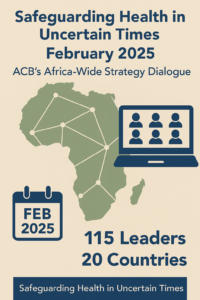Flashback: February 2025 ACB Consultation on Safeguarding Health in Uncertain Times
- September 1, 2025
- African Constituencies / African Constituency Bureau / HIV/AIDS / Local Manufacturing / Resilient and Sustainable Systems for Health (RSSH)
- By The Bureau
Safeguarding Health in Uncertain Times: ACB’s Africa-Wide Strategy Dialogue
Date: 24 February 2025
Format: Virtual Consultation
Participants: 115 health leaders from 20 African countries

Introduction
As global health funding faces major uncertainties, over 100 representatives from ministries of health, Country Coordinating Mechanisms (CCMs) and technical partners across Africa convened for a high-level virtual consultation hosted by the Africa Constituency Bureau (ACB). The urgency stemmed from disruptive shifts in external support—particularly from the U.S.—that threaten the stability of HIV, TB, and malaria programs continent-wide. This was not just a crisis meeting; it was a moment of coordinated strategy, African leadership, and collective determination.
Why This Meeting Mattered
- The U.S. government had paused international development aid, withdrawn from WHO processes, and begun restructuring USAID.
- Global Fund contributions—critical for African countries—face a possible decline, even as the Fund targets an $18 billion replenishment.
- With over 20 million people on antiretroviral therapy (ART), and millions more dependent on malaria and TB services, these funding disruptions posed real threats to lives.
In this context, ACB called for a united response: to assess, share, and strategize across borders—anchoring the region’s voice ahead of upcoming Global Fund governance engagements.
Country-Level Impacts and Responses
🇲🇼 Malawi
- 4,000 health workers funded by partners lost jobs overnight.
- HIV supply chains and data systems were disrupted.
- The government launched a contingency plan, redeploying staff, reprioritising interventions, and pairing government with partner teams at service points.
🇬🇭 Ghana
- Disinformation raised panic, but became a rallying point.
- The CCM led a two-week nationwide media campaign to clarify risks.
- Result: The President announced government commitment to cover the $156 million gap from the U.S. freeze and activated Ghana’s HIV fund.
🇨🇮 Côte d’Ivoire
- High-level diplomatic engagements with U.S. and French ambassadors led to swift national action, with presidential instruction to bridge the funding gap from domestic sources.
🇸🇱 Sierra Leone
- The Community Health Worker (CHW) program lost 20% of its funding, halting support in three districts.
- The Ministry of Health mobilised interim support while planning a longer-term solution.
Innovative Responses from the Region
🇿🇼 Zimbabwe
- Civil society launched Kutavila (“voices”): a toll-free, grassroots system where citizens report medicine shortages and challenges.
- The data is compiled and shared with officials and donors—bridging the gap between community experience and national response.
🇿🇲 Zambia
- CCM representatives flagged a lack of psychosocial support and growing mental health needs among people living with HIV (PLHIV).
- The discussion underscored the emotional toll of financial insecurity on vulnerable communities.
🇰🇪 Kenya
- Reflecting on COVID-19 lessons, Kenya called for greater local manufacturing and economic self-reliance.
- The goal: strategically invest Global Fund and donor aid in domestic supply chains—transforming grants into long-term resilience.
Cross-Cutting Themes from the Discussion
- Coordination gaps: Governments must play a bigger role in setting targets, managing delivery, and integrating implementing partners.
- Targeted service packages: Focusing health worker time on essential interventions improves efficiency during funding gaps.
- Combating misinformation: Social media is both a risk and an opportunity—when used well, it amplifies coordination and accountability.
- Domestic resource mobilisation: Countries are increasingly committed to funding their own health priorities.
Recommendations & Next Steps
- Prepare country positions and mitigation strategies ahead of the upcoming Global Fund Strategy Committee meeting (March 5, 2025).
- Promote stronger partner alignment to avoid fragmentation in service delivery.
- Expand investments in local solutions—from manufacturing to data systems.
- Continue facilitating ACB-hosted dialogues to amplify African leadership and learning.
Conclusion
This was not just a crisis response—it was a showcase of African ingenuity, leadership, and strategic clarity. As global uncertainties rise, Africa is showing the world how to turn disruption into opportunity.
📣 Want to Stay Engaged?
- 📥 Download the full consultation summary: https://docs.google.com/document/d/1lx9-x-Zp4KmW5NoWJMLJ92W-Z1adMOma/edit?usp=drive_link&ouid=108309675867779366634&rtpof=true&sd=true
- Contact us: falemayehu@africabureau.org; damendah@africabureau.org